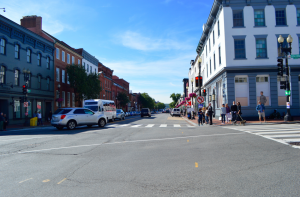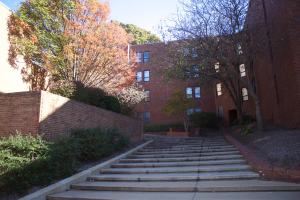As classes start, not every Georgetown student will be joining their peers on Zoom.
Citing concerns about virtual learning and the cost of an online education, more students than Georgetown traditionally sees are opting to go part-time or take a leave of absence for the fall semester. Those putting down their studies are picking up internships, minimum-wage jobs, family obligations, and, in one case, a cross-country road trip.
Lea Marchl (SFS ‘22) had been planning to study abroad this fall, but with all abroad programs canceled, she instead decided to join a friend, Sarah Moreland (COL ‘22), on a road trip across the U.S.
“We’re leaving from Pennsylvania and driving across the north of the country to California, then down the California coast and through the Southwest through Texas and we end in North Carolina,” Marchl said. The pair hopes to travel for over a month and a half, beginning their journey in October and completing it by Thanksgiving.
Marchl and Moreland plan to stay socially distant for the duration of their road trip by camping each night and visiting mainly outside attractions. “We want to explore the national parks, spending the day hiking and the afternoon driving,” Marchl said. Unreliable Wi-fi and the trip’s ever-changing schedule discouraged her from taking on classes part-time. Instead, she plans on spending her free time writing a column for the Voice about the experience.
Although she would have liked to continue courses on-campus, Marchl is excited to begin her road trip and explore the country. “I’ve always wanted to do something like this, and it seemed like a good time,” she said.
Marchl isn’t the only student choosing not to return to classes this semester. “Like many universities across the country, we have seen a modest increase in the number of students choosing to take a leave of absence or attend part-time this year compared to prior years,” a university spokesperson wrote in an email to the Voice.
The spokesperson acknowledged that the switch to online classes factored in students’ choices on whether or not to take a leave of absence. “We know that these decisions are deeply personal, and made with incredible care and consideration for the many factors that come with switching to a virtual curriculum,” they wrote.
As part of their efforts to reduce the number of students taking gap semesters, the university has expanded access to part-time status to all students. Additionally, as an exception, part-time status during Fall 2020 will count towards the four required on-campus semesters of study.
Adam Ginsburg (COL ‘21) sees this online semester as an opportunity to work on a political campaign ahead of the November general election. Ginsburg recently entered a job as a field organizer with Iowa Democrats’ Coordinated Campaign, working on state races up and down the ballot (Full disclosure: Ginsburg is an assistant sports editor for the Voice).
As a field organizer, Ginsburg makes calls to Iowa voters and helps plan events with his organizing team and volunteers. “I start at noon, and I have to make usually more than 200 calls a day,” he said, adding that he often finishes later than 10 p.m. While he’s currently remote-organizing from his home in New York, Ginsburg plans on relocating to Iowa before the election.
Ginsburg cited his former position as an organizing fellow in Iowa for Elizabeth Warren’s presidential campaign as one reason he chose to take the semester off to work with Iowa Democrats. “I feel like I had a connection to Iowa from last summer and I wanted to finish the job,” he said.
Ginsburg also believes Iowa’s competitiveness makes it a place where he can make an impact with his time. “It could be the 51st Senate seat for Democrats. It went for Obama in 2012 and Trump in 2016, and if it flips it could be the deciding votes in the Electoral College.”
One common theme among the students taking gap semesters was that they had enough college credits to pause their academics without delaying their graduation year. However, many other students without these accrued credits—often earned through high school standardized testing or Georgetown summer programs—were unable to have this privilege.
In one nation-wide survey conducted in July, 40 percent of rising university freshmen said they were likely to delay their college plans until after the fall. In that same survey, 28 percent of upperclassmen also indicated they were either likely not to return, or that they were undecided with their fall plans.
While the survey was unclear on whether or not a school’s choice to use online classes decreased the likelihood of four-year college students enrolling in or returning to their school, only 31 percent indicated that taking classes at home this fall was their preference.
Claire Smith (SFS ‘23) is taking a full year off to work for AmeriCorps, a voluntary civil service program funded by the federal government.
Smith’s program, based in her hometown of Cleveland, Ohio with Habitat for Humanity, started in late August and will run for over 10 months, until the summer of 2021. Habitat for Humanity works to build affordable housing for families and individuals in need.
Part of her reasoning for committing to a full gap year was the possibility of an online spring semester or the lack of a future vaccine. “I don’t think I’d be comfortable going back to campus if the course of the virus hasn’t changed,” Smith said.
As a construction crew leader managing volunteers, Smith is looking forward to combining her experience in construction and passion for her community. “I have found service to be very rewarding throughout my life, and I’ve been working in set construction for theater for the last five years so I have a lot of experience with power tools,” she said.
Both the high cost and the personal lower quality of a virtual education contributed to Smith’s decision to take her gap year. “Tuition didn’t change enough for me to be willing to pay the amount that they’re charging for an online semester,” she said. “I really don’t learn well in an online format, and I don’t think any amount of money would have made me want to do that.”
Despite the disappointment of not returning to Georgetown for the fall, Marchl, Ginsburg, and Smith are all confident that they will gain more from their respective gap plans than they would from taking online classes. Smith in particular said her experience in the spring discouraged her from going virtual this semester. “I just didn’t find it as worthwhile,” she said. “I think it would have been detrimental in the long run.”







